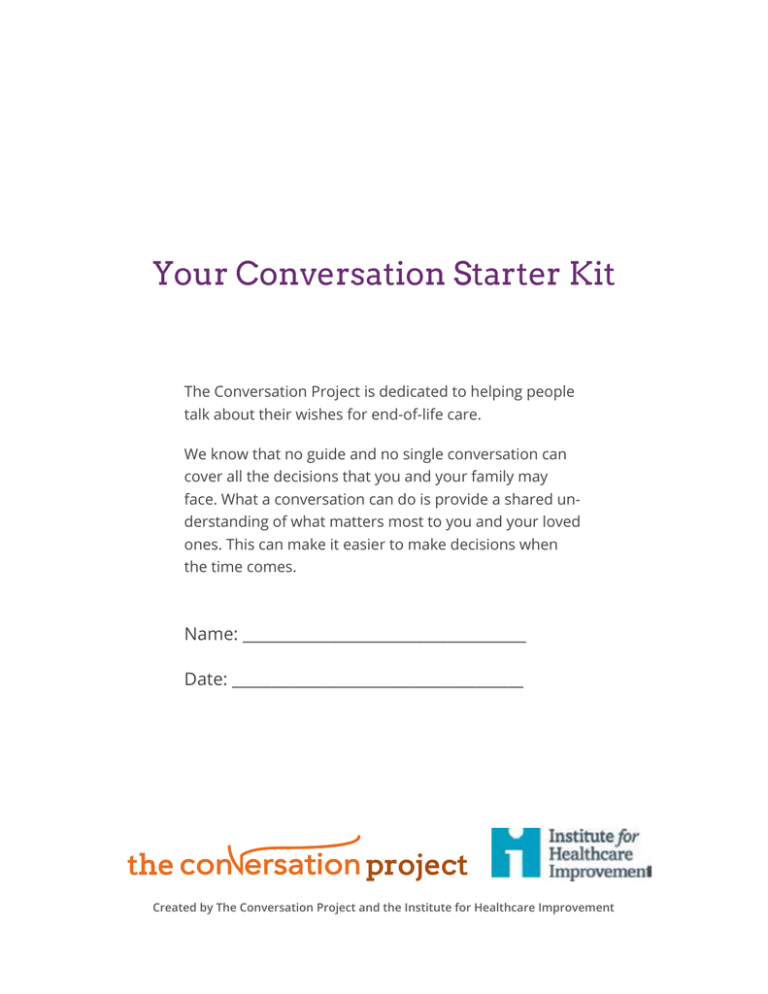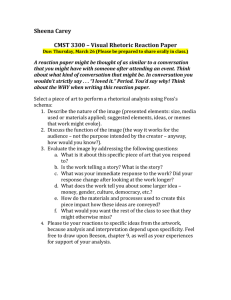
Your Conversation Starter Kit
The Conversation Project is dedicated to helping people
talk about their wishes for end-of-life care.
We know that no guide and no single conversation can
cover all the decisions that you and your family may
face. What a conversation can do is provide a shared understanding of what matters most to you and your loved
ones. This can make it easier to make decisions when
the time comes.
Name: ____________________________________
Date: _____________________________________
Created by The Conversation Project and the Institute for Healthcare Improvement
This document does not seek to provide legal advice. © 2014 The Conversation Project. All rights reserved.
This Starter Kit doesn’t answer every question, but it will help you
get your thoughts together, and then have the conversation with
your loved ones.
You can use it whether you are getting ready to tell someone
else what you want, or you want to help someone else get ready
to share their wishes.
Take your time. This kit is not meant to be completed in one
sitting. It’s meant to be completed as you need it, throughout
many conversations.
Step 1: Get Ready
........................................................ 1
Step 2: Get Set ................................................................
3
Step 3: Go ............................................................................
6
Step 4: Keep Going ......................................................
9
Copyright © 2014 The Conversation Project
All rights reserved. Individuals may photocopy these materials for educational, not-fornsed in any way and
that proper attiribution is given to The Conversation Project, including its web address
theconversationproject.org, as the source of content. These materials may not be
means, or republished
under any circumstances, without written permission of The Conversation Project.
www.TheConversationProject.org
Institute for Healthcare Improvement www.ihi.org
This document does not seek to provide legal advice. © 2014 The Conversation Project. All rights reserved.
Step 1: Get Ready
There are a million reasons to avoid having the conversation. But it’s critically important.
And you can do it.
Consider the facts.
More than 90% of the people think it’s important to talk about their loved ones’ and their own
wishes for end-of-life care.
Less than 30% of people have discussed what they or their family wants when it comes to
end-of-life care. Source: National Survey by The Conversation Project 2013.
60% of people say that making sure their family is not burdened by tough decisions
is “extremely important”
56% have not communicated their end-of-life wishes
Source: Survey of Californians by the California HealthCare Foundation (2012)
70% of people say they prefer to die at home
70% die in a hospital, nursing home, or long-term-care facility
Source: Centers for Disease Control (2005)
80% of people say that if seriously ill, they would want to talk to their doctor about
end-of-life care
7% report having had an end-of-life conversation with their doctor
Source: Survey of Californians by the California HealthCare Foundation (2012)
82% of people say it’s important to put their wishes in writing
23% have actually done it
Source: Survey of Californians by the California HealthCare Foundation (2012)
One conversation can make all the difference.
1
www.TheConversationProject.org
Institute for Healthcare Improvement www.ihi.org
This document does not seek to provide legal advice. © 2014 The Conversation Project. All rights reserved.
Remember:
You don’t need to talk about it just yet. Just think about it.
You can start out by writing a letter—to yourself, a loved one, or a friend.
Think about having a practice conversation with a friend.
These conversations may reveal that you and your loved ones disagree. That’s okay.
It’s important to simply know this, and to continue talking about it now—not during
a medical crisis.
What do you need to think about or do before you feel ready to have the conversation?
2
www.TheConversationProject.org
Institute for Healthcare Improvement www.ihi.org
This document does not seek to provide legal advice. © 2014 The Conversation Project. All rights reserved.
Step 2: Get Set
Now, think about what you want for end-of-life care.
Start by thinking about what’s most important to you. What do you value most?
What can you not imagine living without?
What matters to me at the end of life is
Sharing your “What matters to me” statement with your loved ones could be a big help down the
road. It could help them communicate to your doctor what abilities are most important to you—
what’s worth pursuing treatment for, and what isn’t.
Where I Stand scales
Select the number that best represents your feelings on the given scenario.
As a patient...
1
2
3
4
I want to know
as much as I can
I only want to know
the basics
1
2
3
4
Ignorance
is bliss
1
I want my doctors to
do what they think
is best
5
5
I want to know how
long I have to live
2
3
4
5
I want to have a say
in every decision
3
www.TheConversationProject.org
Institute for Healthcare Improvement www.ihi.org
This document does not seek to provide legal advice. © 2014 The Conversation Project. All rights reserved.
Look at your answers.
What kind of role do you want to play in the decision-making process?
How long do you want to receive medical care?
1
2
3
4
Quality of life is
more important to
me than quantity
I want to live as
long as possible,
no matter what
1
2
3
4
I’m worried that
I won’t get
enough care
1
5
5
I’m worried that
I’ll get overly
aggressive care
2
3
4
I wouldn’t mind
being cared for in
a nursing facility
5
Living independently
is a huge priority
for me
Look at your answers.
What do you notice about the kind of care you want to receive?
4
www.TheConversationProject.org
Institute for Healthcare Improvement www.ihi.org
This document does not seek to provide legal advice. © 2014 The Conversation Project. All rights reserved.
How involved do you want your loved ones to be?
1
2
3
4
I want my loved ones to do
exactly what I’ve said, even
if it makes them a little
1
I want my loved ones to do
what brings them peace,
even if it goes against
what I’ve said
2
3
4
I don’t want my
loved ones to know
everything about
my health
5
I want to be
surrounded by
my loved ones
When the time
comes, I want to
be alone
1
5
2
3
4
5
I am comfortable with
those close to me
knowing everything
about my health
What role do you want your loved ones to play? Do you think that your loved ones
know what you want or do you think they have no idea?
What do you feel are the three most important things that you want your friends,
family and/or doctors to understand about your wishes for end-of-life care?
1. _________________________________________________________________________________________________
2. _________________________________________________________________________________________________
3. _________________________________________________________________________________________________
5
www.TheConversationProject.org
Institute for Healthcare Improvement www.ihi.org
This document does not seek to provide legal advice. © 2014 The Conversation Project. All rights reserved.
Step 3: Go
When you’re ready to have the conversation, think about the basics.
Mark all that apply:
Who do you want to talk to? Who do you trust to speak for you?
Mom
Child/Children
Friend
Dad
Partner/Spouse
Doctor/Caregiver
Sibling
Minister/Priest/Rabbi
Other: ______________________
When would be a good time to talk?
The next big holiday
Before my next big trip
At Sunday dinner
Before I get sick again
Before my kid goes
to college
Before the baby arrives
Other: ______________________
Where would you feel comfortable talking?
At the kitchen table
On a walk or hike
At a cozy café or
restaurant
Sitting in a garden
or park
On a long drive
At my place of worship
Other: ______________________
What do you want to be sure to say?
If you wrote down your three most important things at the end of Step 2, you can use those here.
6
www.TheConversationProject.org
Institute for Healthcare Improvement www.ihi.org
This document does not seek to provide legal advice. © 2014 The Conversation Project. All rights reserved.
How to start
Here are some ways you could break the ice:
“I need your help with something.”
Remember how someone in the family died—was it a “good” death or a “hard” death?
“I was thinking about what happened to (Uncle Joe), and it made me realize…”
“Even though I’m okay right now, I’m worried that (I’ll get sick), and I want to be prepared.”
“I need to think about the future. Will you help me?”
“I just answered some questions about how I want the end of my life to be. I want you
to see my answers. And I’m wondering what your answers would be.”
What to talk about
When you think about the last phase of your life, what’s most important to you?
How would you like this phase to be?
Do you have any particular concerns about your health? About the last phase of your life?
Who do you want (or not want) to be involved in your care? Who would you like to make
decisions on your behalf if you’re not able to? (This person is your health care proxy.)
Would you prefer to be actively involved in decisions about your care? Or would you
rather have your doctors do what they think is best?
Are there any disagreements or family tensions that you’re concerned about?
Are there circumstances that you would consider worse than death? (Long-term need
of a breathing machine or feeding tube, not being able to recognize your loved ones)
Are there important milestones you’d like to meet if possible? (The birth of your
grandchild, your 80th birthday)
7
www.TheConversationProject.org
Institute for Healthcare Improvement www.ihi.org
This document does not seek to provide legal advice. © 2014 The Conversation Project. All rights reserved.
Where do you want (or not want) to receive care? (Home, nursing facility, hospital)
What kinds of aggressive treatment would you want (or not want)? (Resuscitation if your
heart stops, breathing machine, feeding tube)
When would it be okay to shift from a focus on curative care to a focus on comfort
care alone?
(Personal
property, relationships)
This list doesn’t cover everything you may need to think about, but it’s a good place to start.
Talk to your doctor or nurse if you’re looking for more end-of-life care questions.
Remember:
Be patient. Some people may need a little more time to think.
You don’t have to steer the conversation; just let it happen.
Nothing is set in stone. You and your loved ones can always change your minds
as circumstances shift.
Every attempt at the conversation is valuable.
everything right now.
Now, just go for it!
Each conversation will empower you and your loved ones. You are getting ready to help each
other live and die in a way that you choose.
8
www.TheConversationProject.org
Institute for Healthcare Improvement www.ihi.org
This document does not seek to provide legal advice. © 2014 The Conversation Project. All rights reserved.
Step 4: Keep Going
Congratulations!
Now that you have had the conversation, here are some legal and medical documents you should
know about. Use them to record your wishes so they can be honored when the time comes.
Advance Care Planning (ACP): the process of thinking about your wishes—exactly what
you have been working on here.
Advance Directive (AD): a document that describes your wishes.
Health Care Proxy (HCP):
person you trust to act on your behalf if you are unable to make health care decisions or
communicate your wishes. In some states, this is called the Durable Power of Attorney for
Health Care. This is probably the most important document. Make sure you have many
conversations with your proxy.
Living Will:
life, or if you are no longer able to make decisions on your own (e.g. in a coma).
of the website Starter Kit at www.TheConversationProject.org.
then look back to them when you prepare for future conversations.
Is there something you need to clarify that you feel was misunderstood
or misinterpreted?
9
www.TheConversationProject.org
Institute for Healthcare Improvement www.ihi.org
This document does not seek to provide legal advice. © 2014 The Conversation Project. All rights reserved.
Who do you want to talk to next time? Are there people who should hear things
at the same time (like siblings who disagree about everything)?
How did this conversation make you feel? What do you want to remember?
What do you want your loved ones to remember?
What do you want to make sure to ask or talk about next time?
We hope you will share this Starter Kit with others. You have helped us get one conversation
closer to our goal: that everyone’s end-of-life wishes are expressed and respected.
10
www.TheConversationProject.org
Institute for Healthcare Improvement www.ihi.org



